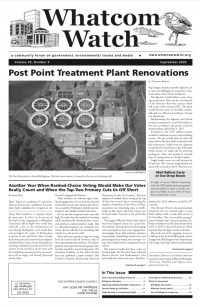by Anna Hoekman
The Asian giant hornet, also known as Vespa mandarinia, is the world’s largest species of hornet. Originating from Japan and other Asian countries, these insects can measure anywhere from 1.5 inches to over 2 inches, and are equipped with both mandibles and a very painful sting.
The Asian giant hornets pose a significant risk to the honeybee population. Just a few hornets can destroy a honeybee hive in a matter of hours, notably by entering what is called a “slaughter phase” in which they decapitate the bees, taking over the hive and using the brood to feed their offspring. These hornets were first sighted in Washington in December 2019, near Blaine. Since then, there have been more confirmed sightings, raising concerns about the environmental impact they could have on an already struggling bee population if they become established in the state, as well as public health concerns. In response, the Washington State Department of Agriculture launched a trapping and monitoring program through which Washington citizens can report sightings of this invasive species.
With so many acres of land throughout Whatcom County, Whatcom Land Trust had the perfect opportunity to get involved, and partnered with the Department of Agriculture to provide willing volunteers with the resources needed to create traps for Asian giant hornets. The Land Trust’s Stewardship Director, Jennifer Mackey, worked hard to coordinate and distribute traps, alcohol, and other necessary supplies. Twenty-five volunteers, staff, and conservation easement landowners volunteered their time to prepare and monitor over 50 traps from July through October, spread out across Land Trust properties across the county, including one trap at the Whatcom Land Trust office!
This trap continues to be monitored by Office Manager, Kristy Lee. As a student beekeeper, Kristy had a personal motivation to participate. “This program is important because, in addition to hunting most types of insects, Asian giant hornets hunt and attack honeybee hives. As many people know, honeybee populations are declining at a frightening rate due to a variety of factors inducing habitat loss, pesticides and the varroa mite,” Kristy says. “It is essential we monitor and control this invasive species to the best of our ability before they have the chance to negatively impact our environment.”
Another volunteer, biologist Vikki Jackson, completely understands the issue of a new invasive species. Jackson says she is happy to see the Land Trust get involved with this work. Together with a friend, she monitors six traps in the North Fork and South Fork areas. “It’s a fun way to contribute and get outside on the Land Trust’s properties,” she says of the program, “you can always go on a hike after you check the traps!”
Whatcom Land Trust is excited to continue this partnership with the Washington State Department of Agriculture. It is crucial to keep the lands we live on safe for the native insects and other animals that call them home.
https://www.whatcomlandtrust.org/2020/08/07/asian-giant-hornets/
https://agr.wa.gov/departments/insects-pests-and-weeds/insects/hornets
Hornet Watch Report Form: https://www.maps.arcgis.com/apps/GeoForm/index.html?appid=e3720c303c414210967920b07bad13f5
From Love This Land: Whatcom Land Trust




























